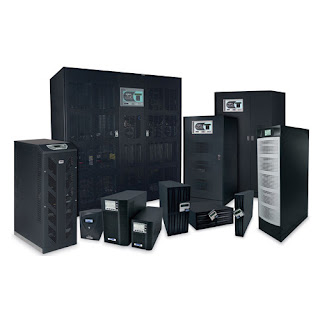Understanding Uninterruptible Power Supply (UPS) and Its Importance in Data Centers
{start}
In today's digital age, where businesses rely heavily on technology to function and store critical data, maintaining a consistent and reliable power supply is paramount. This is where an Uninterruptible Power Supply (UPS) comes into play. In this article, we'll delve into the definition, working principles, types, and significance of UPS in the context of data centers. Join us as we uncover the essential role that UPS plays in ensuring uninterrupted operations for businesses and organizations.
What is an Uninterruptible Power Supply (UPS)?
At its core, an Uninterruptible Power Supply, often referred to as UPS, is an electrical apparatus that provides emergency power to a load when the input power source, typically the main electrical grid, experiences a disruption or failure. The primary purpose of a UPS is to bridge the gap between power outages and the activation of backup power generators, ensuring that critical systems and equipment remain operational without any interruption.
How Does a UPS Work?
A UPS functions as a buffer between the main power supply and the load it's protecting. When the UPS detects a drop or loss of input power, it seamlessly switches to its internal battery power. This transition is almost instantaneous, ensuring that there's no noticeable disruption to the connected devices. The stored energy in the UPS batteries not only provides power during brief outages but also allows enough time for backup generators to start up and take over the power supply.
Types of UPS Systems
Offline/Standby UPS: This type of UPS remains inactive during normal operation and only activates its battery when a power disruption occurs. It's a cost-effective solution for devices that can tolerate a brief delay during the switchover.
Line-Interactive UPS: In this design, the UPS constantly regulates the incoming voltage to ensure a steady output. It offers protection against both power interruptions and voltage fluctuations.
Online/Double-Conversion UPS: This UPS provides the highest level of protection as it supplies power from its battery at all times. The incoming AC power is converted to DC and then back to AC, ensuring a clean and consistent power output.
The Significance of UPS in Data Centers
Data centers serve as the nerve centers for modern businesses, storing and processing vast amounts of critical information. Any disruption in their operations can lead to severe financial and reputational losses. Here's where the importance of UPS becomes crystal clear:
Ensuring Continuous Availability
Data centers host a wide array of servers, networking equipment, and storage systems that need to operate 24/7. Even the briefest power interruption can lead to downtime, resulting in lost revenue and customer dissatisfaction. A UPS acts as a safeguard, providing immediate power during outages and allowing the data center's backup generators to start up smoothly.
Preventing Data Loss and Corruption
Abrupt power loss can lead to data loss or corruption, which is a nightmare for any organization. The UPS not only keeps the systems running but also ensures that ongoing processes and data transactions are completed safely before shutting down the equipment.
Voltage Regulation and Surge Protection
Voltage fluctuations and power surges can cause irreparable damage to sensitive electronic components. The UPS regulates the voltage and filters out surges, guaranteeing a stable and clean power supply to the connected devices.
Conclusion
In the world of technology, where digital operations reign supreme, the significance of an Uninterruptible Power Supply cannot be overstated. It serves as a guardian against power disruptions, data loss, and equipment damage. With its various types catering to different needs, the UPS ensures that businesses can continue their operations seamlessly, regardless of external power challenges.
{finish}
FAQs about Uninterruptible Power Supply (UPS)
Q1: Can a UPS replace backup generators in a data center?
No, a UPS and backup generators serve different purposes. While a UPS provides immediate power during outages and bridges the gap until backup generators start, generators provide long-term power during extended outages.
Q2: How often should UPS batteries be replaced?
UPS batteries typically have a lifespan of 3 to 5 years. Regular inspections and testing are crucial, and batteries should be replaced as recommended by the manufacturer to ensure optimal performance.
Q3: Can a UPS protect against all types of power disturbances?
While a UPS can protect against power interruptions, voltage fluctuations, and surges, it might not offer complete protection against lightning-induced surges or very large power spikes.
Q4: Are all UPS systems the same size?
No, the size of a UPS system depends on the load it needs to support. Larger data centers or facilities with more critical equipment require larger UPS systems with higher power capacities.
Q5: Can a UPS system be remotely monitored?
Yes, many modern UPS systems come with remote monitoring capabilities. This allows administrators to monitor the UPS's status, battery health, and other parameters from a centralized location.

